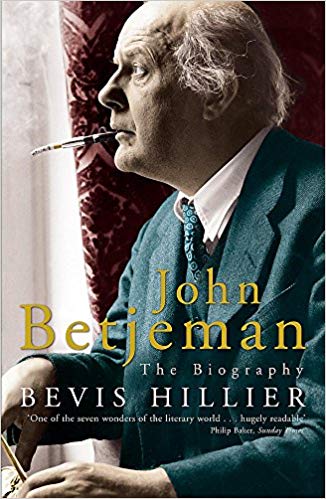John Betjeman - Muses & The Beau Monde
- Lilium

- Jan 8, 2020
- 4 min read
Updated: Sep 13, 2020

Sir John Betjeman CBE, born in London on 28 August 1906, was an English poet, writer, and broadcaster who described himself in Who's Who as a "poet and hack".
Betjeman's early schooling was at the local Byron House and Highgate School, where he was taught by poet T. S. Eliot. After this, he boarded at the Dragon School preparatory school in North Oxford and Marlborough College, a public school in Wiltshire. He founded The Heretick, a satirical magazine that lampooned Marlborough's obsession with sport. Focusing on satire on both local and national events, its editors have included Anthony Blunt and Jack Whitehall. Its motto is "Upon Philistia will I triumph".

At Oxford University, Betjeman made little use of the academic opportunities. His tutor, a young C. S. Lewis, regarded him as an "idle prig" and Betjeman in turn considered Lewis unfriendly, demanding, and uninspiring as a teacher.
At Oxford he befriended Maurice Bowra, who later went on to become the Warden of Wadham. Betjeman had a poem published in Isis, the university magazine, and served as editor of the Cherwell student newspaper during 1927. His first book of poems was privately printed with the help of fellow student Edward James.

He famously brought his teddy bear Archibald Ormsby-Gore up to Magdalen with him, the memory of which inspired his Oxford contemporary Evelyn Waugh to include Sebastian Flyte's teddy Aloysius in Brideshead Revisited. Much of this period of his life is recorded in his blank verse autobiography Summoned by Bells published in 1960 and made into a television film in 1976.
In a 1976 interview with Radio Times, Sir John Betjeman spoke about the poem.
"I think people’s lives are interesting only up until they're 21… It's one’s first humiliations and struggles that are very interesting, so I thought I'd record them. I remember the sensual thrills one has as a child, the feeling of textures and the smell of things. I tried to put that down."

And while Aloysius may be Archibald’s most famous literary representation, it’s not the only one: in the 1940s, Betjeman wrote a book for his children, titled Archie and the Strict Baptists. (The main character, a practicing Baptist, is a keen amateur archeologist.) An illustrated version appeared in 1977. The bear, which Betjeman was holding when he died, now resides in St. Pancras, with his elephant companion, Jumbo.
While at Oxford Betjeman became part of what's now known as the Oxford Wits, who were an identifiable group of literary and intellectual aesthetes and dandies, present as undergraduates at the University of Oxford in the first half of the 1920s. Though they were not known by this term at the time.

Betjeman left Oxford without a degree. He worked briefly as a private secretary, school teacher and film critic for the Evening Standard, where he also wrote for their high-society gossip column, the Londoner's Diary.
He was employed by the Architectural Review between 1930 and 1935, as a full-time assistant editor, following their publishing of some of his freelance work. Timothy Mowl (2000) says, "His years at the Architectural Review were to be his true university".
By 1948 Betjeman had published more than a dozen books, five of these were verse collections. Sales of his Collected Poems in 1958 reached 100,000. The popularity of the book prompted Ken Russell to make a film about him, John Betjeman: A Poet in London (1959).
He continued writing guidebooks and works on architecture during the 1960s and 1970s and started broadcasting. He was a founder member of the Victorian Society (1958).
"Oh! Fuller's angel cake, Robertson's marmalade," he writes, "Liberty lampshades, come shine on us all."
In 1973 he made a widely acclaimed television documentary for the BBC called Metro-Land, directed by Edward Mirzoeff. In 1974, Betjeman and Mirzoeff followed up Metro-Land with A Passion for Churches, a celebration of Betjeman's beloved Church of England. In 1975, he proposed that the Fine Rooms of Somerset House should house the Turner Bequest, so helping to scupper the plan of the Minister for the Arts for a Theatre Museum to be housed there.

Betjeman was fond of the ghost stories of M.R. James and supplied an introduction to Peter Haining's book M.R. James – Book of the Supernatural. He was susceptible to the supernatural. Diana Mitford tells the story of Betjeman staying at her country home, Biddesden House, in the 1920s. She says, "he had a terrifying dream, that he was handed a card with wide black edges, and on it his name was engraved, and a date. He knew this was the date of his death".
For the last decade of his life Betjeman suffered increasingly from Parkinson's disease. He died at his home in Trebetherick, Cornwall, on 19 May 1984, aged 77, and is buried nearby at St Enodoc's Church.
By By
John Betjeman Bevis Hillier
Above is 'John Betjeman - A Passion For Churches', my favourite of the documentary films by Mr Betjeman. He takes you round his favourite churches in England and shows you their architectural details. It is also a time capsule of English village life that was once based around the church, the focal point of the community and the village.
Watching people and families prepare for the church fete, the choirs practicing as the vicar builds model trains in a room nearby and visitors to the village practicing the almost forgotten hobby of brass rubbing is a wonderfully calming contrast to the hecticness of 21st century life.









Comments